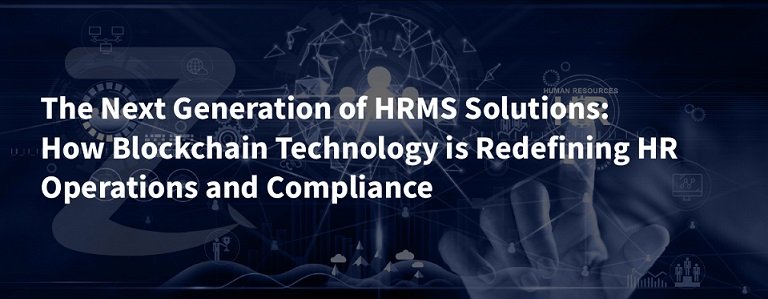
"Discover how Blockchain Technology is revolutionizing HRMS solutions and transforming HR operations and compliance in this insightful read. Explore the benefits and opportunities of the Next Generation of HRMS Solutions and stay ahead of the game with this comprehensive guide."
Description:
The human resources management system (HRMS) is a vital resource for any organization, and its significance cannot be overstated. HRMS solutions streamline various HR operations, including recruitment, employee management, payroll, and compliance. However, with the swift progress in technology, the upcoming generation of HRMS solutions is set to reshape HR operations and compliance.
One of the most promising innovations that could transform HRMS solutions is blockchain. This pioneering technology presents numerous advantages that can enhance HR operations, including transparency, security, and efficiency. In this article, we will discuss how blockchain technology is reshaping HR operations and compliance.
What is blockchain technology?
Blockchain technology is a decentralized, digital ledger that allows secure and transparent transactions without the need for a central authority. Each transaction is recorded in a block, which is linked to the previous block, forming a sequential chain or a blockchain. The technology is recognized for its security, transparency, and immutability, making it ideal for applications that require secure and tamper-proof record-keeping. Blockchain technology finds applications across various industries, including finance, healthcare, supply chain management, and more.
How is blockchain technology redefining HR operations?
Blockchain technology is transforming HR operations by offering a secure and transparent platform for managing employee information. With blockchain technology, HRMS solutions can:
-
Ensure data security: Blockchain technology offers a secure environment for storing sensitive employee information. Its decentralized architecture means that data is distributed across a network of nodes, making unauthorized access and breaches difficult for cybercriminals.
-
Enhance data privacy: Blockchain technology empowers HRMS solutions to store employee data in an encrypted format, ensuring that only authorized personnel can access it. This protects employee privacy and prevents unauthorized access to sensitive information.
-
Streamline background checks: With blockchain technology, HRMS solutions can simplify background checks by providing a secure and tamper-proof platform for verifying employee credentials. This minimizes the time and costs associated with conducting background checks while ensuring that the information is accurate and reliable.
-
Improve compliance: Blockchain technology assists HRMS solutions in adhering to regulatory requirements by offering a transparent platform for tracking and verifying employment data. This helps to mitigate the risk of non-compliance and ensures that HR operations comply with industry regulations.
-
Facilitate secure employee payments: Blockchain technology enables HRMS solutions to facilitate secure and transparent employee payments, minimizing the risk of fraudulent transactions and ensuring that employees are paid accurately and on time.
What are the benefits of blockchain-based HRMS solutions?
Blockchain-based HRMS solutions provide a range of advantages, including:
-
Enhanced security: Blockchain technology delivers a secure platform for storing sensitive employee information, shrinking the risk of data breaches and cyber threats.
-
Increased efficiency: Blockchain technology can streamline HR operations by improving processes and reducing the need for manual data entry.
-
Improved transparency: Blockchain technology empowers HRMS solutions to offer transparent access to employee data, diminishing the risk of errors and discrepancies.
-
Reduced costs: Blockchain technology can lower the expenses associated with HR operations by removing the need for intermediaries and decreasing the time and effort required for background checks.
-
Greater trust: Blockchain technology provides a tamper-proof platform for verifying employee information, fostering trust among employers, employees, and regulatory authorities.
-
Enhanced privacy: Blockchain technology enables HRMS solutions to store employee data securely, ensuring that only authorized personnel can access it, thereby augmenting privacy and confidentiality.
-
Improved compliance: Blockchain technology assists HRMS solutions in meeting regulatory requirements by offering a transparent platform for tracking and verifying employee data, minimizing the risk of non-compliance and ensuring that HR operations align with industry standards.
Conclusion: The next generation of HRMS solutions is set to redefine HR operations and compliance, with blockchain technology leading this transformation. Blockchain technology provides numerous benefits, including enhanced data management and security, increased efficiency in HR operations, and better compliance management. As organizations increasingly embrace blockchain technology, we can anticipate substantial advancements in HRMS solutions.